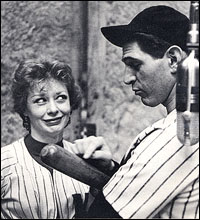
*
From 1949 to 1953 the New York Yankees won five consecutive World Series titles. It's not hard to understand, then, the context in which Douglass Wallop wrote his droll 1954 novel, "The Year the Yankees Lost the Pennant." As a modern-day fan of my hometown Baltimore Orioles, who for the last ten years have floundered in the American League East while the Yankees have won the division almost every single year, I can understand Joe Boyd's willingness to sell his soul to Mr. Applegate in order for his beloved and hapless Washington Senators to have a chance for a championship. To quote Wallop's novel: "Could an aim so worthy as denying the Yankees a tenth consecutive pennant be evil?"
Fresh off his success in 1954 with The Pajama Game, director and bookwriter George Abbott turned to Wallop's novel as the basis of his 1955 musical hit, Damn Yankees. He reassembled much of the team from The Pajama Game, including the young songwriters Richard Adler and Jerry Ross. Adler and Ross, both native New Yorkers, began writing together in 1950 and under the guidance of their mentor Frank Loesser, began to achieve real success in 1953. That year they wrote songs for their first Broadway show, the revue John Murray Anderson's Almanac.
More significantly, that same year their song "Rags to Riches" was recorded by Tony Bennett and reached No. 1 on the charts. Over the next two years, they would have many of their songs from The Pajama Game and Damn Yankees also make the hit parade. Rosemary Clooney's "Hey There" topped the charts and Archie Bleyer's "Hernando's Hideaway" came close, as did Patti Page's "Steam Heat." From Damn Yankees, crossover successes included Sarah Vaughan's "Whatever Lola Wants" as well as "Heart" by Eddie Fisher.
 |
||
| Gwen Verdon and Stephen Douglass in a 1955 rehearsal |
That is not to say that Adler and Ross could not be sensitive dramatists when they needed to be. The wonderful Shannon Bolin, who played Meg Boyd in the original Broadway production as well as the film, recounted for me an early rehearsal of the lovely ballad "A Man Doesn't Know." Jerry Ross asked Bolin what she thought her character would say to Joe Hardy after he has sung to her, "A man doesn't know what he has until he loses it." Bolin improvised for him in plain, realistic language: "I know what you mean, Joe, only too well, for I am lonely just like you." They set those exact words to music and I think it is one of the most tender moments in the score.
Adler and Ross were writing pop hits just on the cusp of the advent of rock 'n' roll. Consider that from 1950 to 1954 the Billboard Hot 100 included artists such as Nat King Cole, Bing Crosby, Mario Lanza and Perry Como. Bill Haley's "Rock Around the Clock" appeared on the charts in 1955, the same year as Damn Yankees. And it was in 1956, the year of "Heartbreak Hotel," that the real rock 'n' roll revolution began with the ascension of Elvis Presley and Chuck Berry, among others.
But the team of Adler and Ross would not see 1956. Tragically, Jerry Ross died at age 29 (29!) late in 1955 from bronchiectasis, a lung disorder. And rock 'n' roll is the one musical style absent from the Adler and Ross scores. "Two Lost Souls" in Damn Yankees is the closest they came. In fact it was originally imagined as a rock 'n' roll number, but George Abbott asked them to reconceive it. The vocal score still indicates "heavy rock" and the orchestration and vocal arrangement lean towards the early rock sounds of someone like Louis Prima, but it doesn't go all the way there. As the last song in their last score, it only hints at the directions in which Adler and Ross might have gone.
(Rob Berman is Music Director of New York City Center Encores! This piece appears in the Playbill for the show, July 5-27.)











